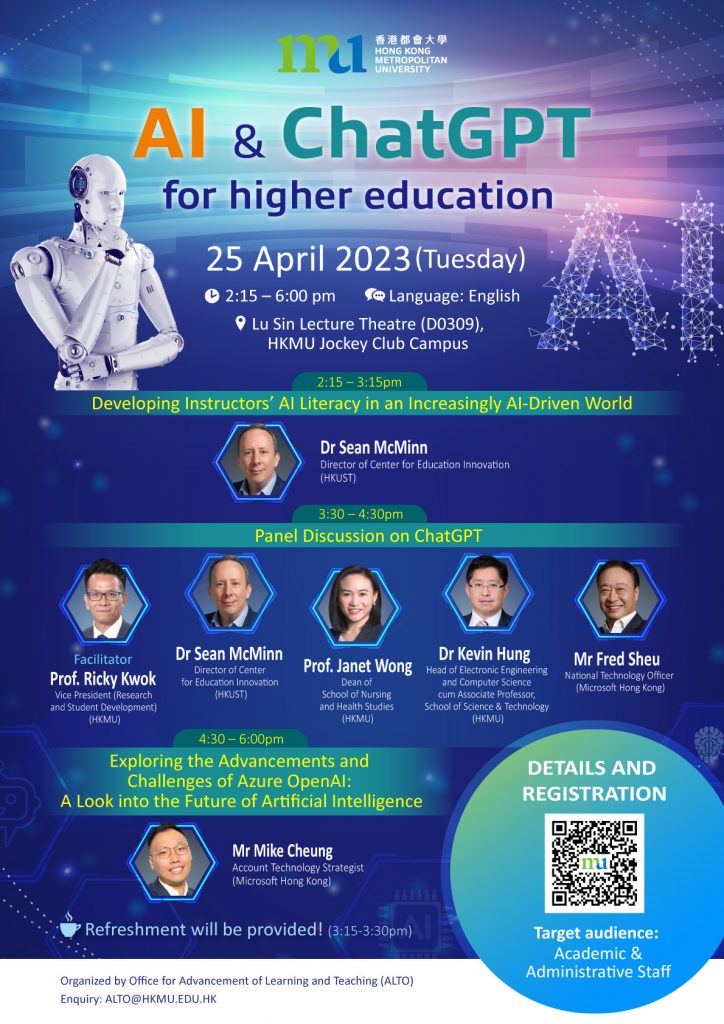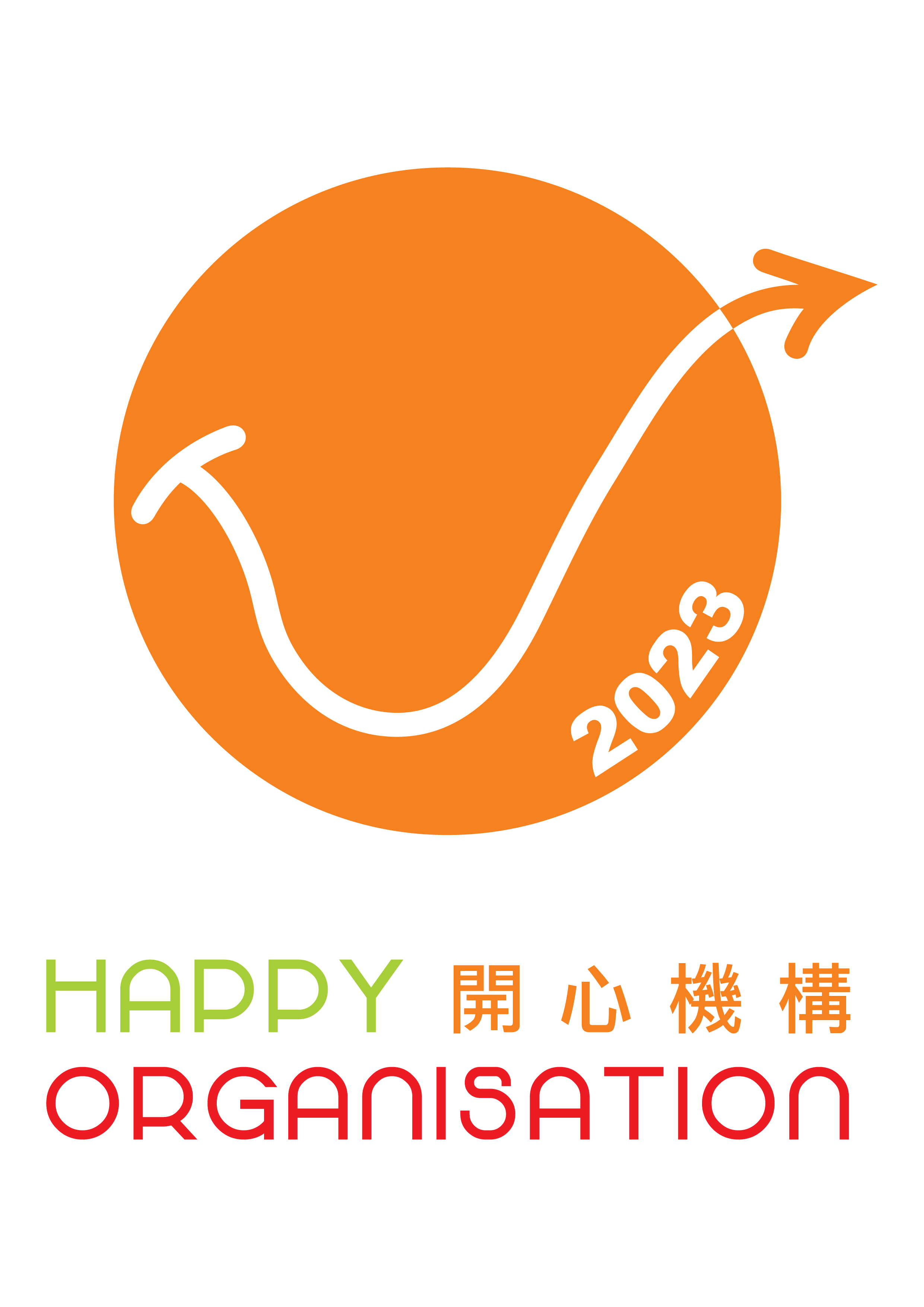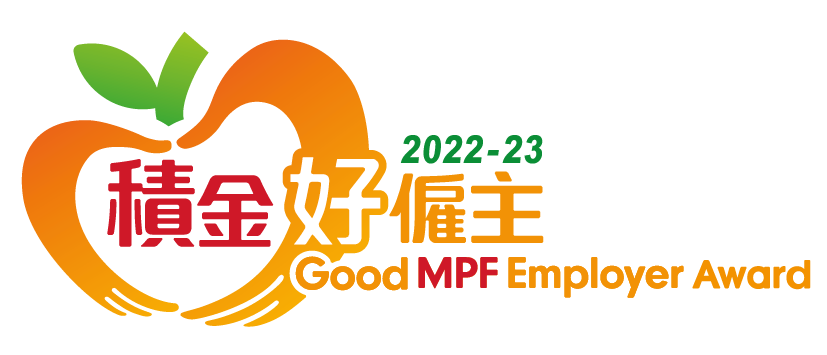| | Date/ Time/ Venue | Theme/Topic/Speaker(s) | Synopsis | Registration |
| 1 | 6 Jun (Tue)
2:00pm – 3:00pm Seminar
(A1217, MC) | [Learning Technologies] Podcasting in higher education Ross Vermeer
Senior Instructional Designer ALTO | In this seminar you'll learn the basics of podcasting, including what podcasts are, and why they've become so popular, what makes for an effective podcast, and how podcasts can be used in higher ed courses. We'll also explore some sources of podcasts that may be suitable as course material, and you'll get a few tips on producing your own podcast. | Link |
| 2 | 6 Jun (Tue)
3:15pm – 4:15pm Seminar
(A1217, MC) | [Learning Technologies] Metaverse: a new learning space for higher education Francis Tsoi
Instructional Designer ALTO | The Metaverse can be a valuable tool to create immersive and interactive learning experiences for students. This interactive seminar will consist of two parts. The first part will introduce some use cases of Metaverse in higher education, and discuss its potential benefits and limitations for teaching and learning. The second part will explore the possible research areas and methodology in using Metaverse. | Link |
| 3 | 6 Jun (Tue)
4:30pm – 5:30pm Seminar
(A1217, MC) | [Pedagogical Principles and Practices] Why educational research? From action research to SoTL (Scholarship of Teaching and Learning) Dr Henry Choi
Senior Instructional Designer ALTO | Though not trained in educational studies, many faculty members engage actively in various educational research. Such educational research can not only enhance their teaching and students' learning in class, but also generate publishable academic works. Could educational research also be your cup of tea? The first part of this seminar introduces the idea of action research and how it can be used to enhance our own teaching. The second part further explores other types of educational research in higher education and the possibility of developing your own SoTL. | Link |
| 4 | 7 Jun (Wed)
2:00pm – 3:00pm Seminar
(A1217, MC) | [Student Engagement] Igniting the spark: Exploring strategies for motivating our students Caroline Leung
Senior Instructional Designer ALTO | Motivation breeds success and we would all like a class of highly motivated students. Are some students inherently more motivated, or are there actions we can take to ignite the motivation spark in our students? This seminar will introduce motivation theories such as Self-Determination Theory and Expectancy Value Theory. Building on these theories, we will explore the practical applications for creating a motivational learning environment. | Link |
| 5 | 7 Jun (Wed)
3:15pm – 4:15pm Seminar
(A1217, MC) | [Pedagogical Principles and Practices] Enhancing learning and memory with cognitive strategies Connie Chan
Instructional Designer ALTO | The ability to retain and recall information is key to learning, however, it can be challenging when information overload occurs. This is where cognitive strategies come in. Cognitive strategies can improve our ability to acquire, store, and retrieve information more effectively, thus enhancing learning and memory. In this seminar, we will introduce some major cognitive strategies that have been shown to enhance learning and memory. | Link |
| 6 | 7 Jun (Wed)
4:30pm – 5:45pm
Workshop
(A1217, MC)
| [Pedagogical Principles and Practices] Enhancing students' employability through inquiry-based learning in Metaverse Ronald Chow
Instructional Designer ALTO | This workshop starts with an introduction to inquiry-based learning Then, it will introduce how teaching staff can utilize the features of Gather Town to design engaging lessons using the inquiry-based learning approach. In the workshop, participants will have hands-on experience in setting up customizable virtual environments, creating personalized avatars, conducting real-time discussions using proximity-based audio, and conducting video conferences on Gather Town. Finally, we will provide scenarios where they can integrate Gather Town into the inquiry-based learning approach. Please bring your own laptop computer. | Link |
| 7 | 8 Jun (Thu)
2:00pm – 3:00pm Seminar
(A1217, MC) | [OBE and Assessment] Objective Questions Ross Vermeer
Senior Instructional Designer ALTO | Student experiences of online education are enhanced by frequent interaction and formative assessment with immediate feedback. Objective, 'right-or-wrong' questions can fill this need, so our first instinct is to turn to MCQs. But a little variety might also be good! True-and-false questions, matching questions, and fill-in-the-blank questions are all objective, too, yet we may feel a bit guilty if we use them: are they 'too easy' for university students? And are they really easier to write than MCQs? In this seminar we'll assess the strengths and weaknesses of 'non-MCQ' objective questions, consider their optimal uses, and learn some strategies for designing them. | Link |
| 8 | 8 Jun (Thu)
3:15pm – 4:15pm Seminar
(A1217, MC) | [Pedagogical Principles and Practices] Developing students' metacognitive skills Emilie Pavey
Instructional Designer ALTO | Students with a strong capacity for metacognition — the ability to think about one’s own thinking processes and to monitor and regulate one’s own cognitive activities — are stronger and more effective learners. This seminar will explore why this is the case and how teachers can promote students' metacognitive awareness through a range of strategies for lesson design and in-class activities, including the use of AI apps for metacognitive development. | Link |
| 9 | 8 Jun (Thu)
4:30pm – 5:45pm Workshop
(A1217, MC) | [Learning Technologies] Workshop for building your teaching ePortfolio Dr Eva Tsang
Director ALTO | This workshop aims to introduce the CELTICS ePortfolio Platform, with demonstration on how to build an ePortfolio on this platform. We will begin with an introduction about the Teaching ePortfolio, followed by some hands-on practice on the platform; such as setting up your profile information, creating an ePortfolio page with digital artifacts, linking multi-media to ePortfolios, building an attractive ePortfolio by using special features, and what makes a good reflection. Please bring your own laptop computer. | Link |
| 10 | 9 Jun (Fri)
2:00pm – 3:00pm Seminar
(A1217, MC) | [Pedagogical Principles and Practices] Designing blended learning courses Dr Eva Tsang
Director ALTO | This seminar will explore effective strategies for combining traditional classroom instruction with online activities and digital resources in agile approach. Discuss how to design engaging, hybrid curriculums that cater to diverse learning styles, foster collaboration, and leverage technology for enhanced learning outcomes. It will also illustrate the best practices in course design, assessment, and facilitation for blended learning experience followed by examples. | Link |
| 11 | 9 Jun (Fri)
3:15pm – 4:15pm Seminar
(A1217, MC) | [Pedagogical Principles and Practices] Evaluating and improving teaching and learning through TPACK Connie Chan
Instructional Designer ALTO | With teaching and learning increasingly taking place in a technology-driven environment, are you looking for a more effective way to evaluate and improve your teaching practices and student learning? TPACK – a model that helps educators integrate technology into their teaching practices – could be the answer to your question. In this seminar, we will briefly introduce the concept of TPACK and discuss how it can be used to evaluate and improve teaching and learning. | Link |
| 12 | 9 Jun (Fri)
4:30pm – 5:45pm Workshop
(A1217, MC) | [Pedagogical Principles and Practices] Teaching with case studies Caroline Leung
Senior Instructional Designer ALTO | Theory is only theory until we can see how it applies in different contexts. Case studies are a tried and tested method for enabling students to apply knowledge to solve realistic problems. Using hands-on examples, this workshop explores the characteristics of a well-written case study and how to adapt a case to increase its teaching value for your course. Please bring your own laptop computer. | Link |












